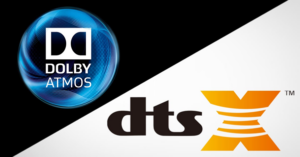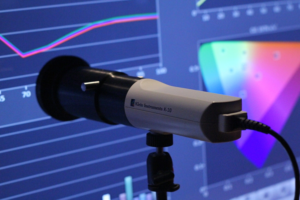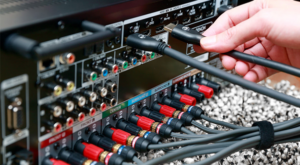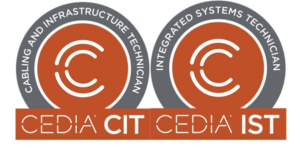Why Professional Installation for Home Theatre Systems Remains Essential
The intricate nature of home theatre systems and the evolving technological landscape demand specialised knowledge and expertise for proper installation. This article offers a comprehensive technical perspective on the reasons professional installation remains vital for home theatre systems.
By Matthew Hale
The intricate nature of home theatre systems and the evolving technological landscape demand specialised knowledge and expertise for proper installation. This article offers a comprehensive technical perspective on the reasons professional installation remains vital for home theatre systems.
Modern home theatre systems incorporate state-of-the-art components like Dolby Atmos and DTS:X-enabled speakers, 4K and 8K projectors, OLED and QLED displays, and advanced AV receivers with multi-channel support. Each component has its unique specifications, and configuring them correctly requires a deep understanding of the interplay between various devices. Professional installers possess the technical acumen needed to ensure optimal performance and compatibility among components.

The effectiveness of a home theatre system relies heavily on room acoustics. Professionals use tools like Real-Time Analyzer (RTA) and Room EQ Wizard (REW) to analyse a room’s frequency response and reverberation times, allowing them to make informed decisions about speaker placement, room treatments, and sound absorption. Additionally, they employ advanced calibration software, such as Audyssey MultEQ, Dirac Live, and Anthem Room Correction (ARC), which can automatically adjust speaker levels, delays, and equalisation settings to optimise the listening experience.
High-resolution displays and projectors necessitate proper calibration for accurate colour reproduction, contrast, and brightness. Professional installers use tools like VideoForge PRO signal generators and CalMAN calibration software to fine-tune the video settings based on industry standards, such as Rec. 709, Rec. 2020, and HDR10. This process is crucial in achieving optimal picture quality, ensuring uniformity, and eliminating artefacts like banding and colour shifts.

Home theatre systems often need integration with home automation systems like Control4, Crestron, and Savant. These systems can control lighting, HVAC, security, and other connected devices, enhancing the overall user experience. Professional installers possess the know-how to program and configure these systems, ensuring seamless interaction between your home theatre and other smart devices.
Cable management is a critical aspect of home theatre installation, particularly with high-end systems that require long cable runs and multiple connections. Professionals use techniques like in-wall or in-ceiling cable routing, conduit systems, and cable raceways to keep cables organised and concealed. This not only maintains the aesthetic appeal of the space but also ensures proper signal transmission and minimises electromagnetic interference.

Professional home theatre installations should adhere to industry standards, such as HDMI 2.1 specifications, HDCP 2.2 compliance, and high-speed Ethernet connections. Furthermore, professionals follow safety guidelines and local building codes when working with electrical wiring or mounting heavy equipment. This adherence ensures that your home theatre system is installed safely and securely while maintaining peak performance.
Home theatre systems are susceptible to technical issues, such as HDMI handshaking problems, audio dropouts, and video artefacts. Professional installers have the expertise to diagnose and resolve these issues effectively. Moreover, they can install firmware updates for components like AV receivers, projectors, and media players, ensuring that your system stays up-to-date with the latest features and performance improvements.
As technology advances, new devices and standards emerge, requiring periodic updates to your home theatre system. Professional installers can recommend and implement future-proof solutions, such as modular systems, upgradable components, and expandable wiring infrastructure. This foresight ensures that your system remains compatible with new technologies and can be easily upgraded or expanded as needed.
A home theatre system often relies on a robust network infrastructure to support high-quality streaming and seamless device integration. Professional installers are experienced in configuring wired and wireless networks, optimising network settings for low-latency streaming, and implementing QoS (Quality of Service) policies to prioritise bandwidth for your home theatre system. This expertise is crucial in achieving a stable and high-performance network environment, especially for streaming 4K and 8K content.

Every home theatre system is unique, with specific requirements and constraints based on room dimensions, layout, and user preferences. Professional installers offer personalised consultation, design, and installation services, ensuring that your system is tailored to your needs. They can also suggest and implement creative solutions for unconventional spaces, such as hidden speakers, motorised screens, and custom furniture, to make the most of your available space.
The technical intricacies and evolving nature of home theatre systems demand a level of expertise that goes beyond the capabilities of most DIY enthusiasts. From complex equipment configuration and advanced calibration to seamless integration and future-proofing, professional installation remains essential in achieving an optimal entertainment experience. By investing in professional installation, you can enjoy the many benefits of a high-quality home theatre system without compromising on performance, safety, or aesthetics.
As the home theatre industry continues to advance and evolve, professionals specialising in installation and integration must keep pace with the latest technologies, techniques, and trends. Continuous professional development is crucial in maintaining expertise, providing exceptional services to clients, and staying ahead of the competition. In this section, we will explore various professional development opportunities available for those working in the field of home theatre integration.
- Industry-Specific Certifications
Numerous industry organisations offer certifications that demonstrate proficiency in various aspects of home theatre integration. These certifications provide valuable credentials and can help professionals stay up-to-date with the latest developments in the field. Examples of industry-specific certifications include:
- CEDIA (Custom Electronic Design & Installation Association): CEDIA offers a range of certifications, such as the CEDIA Electronic Systems Certified (ESC) program, which covers essential industry knowledge and best practices, and the CEDIA Certified Networking Specialist (ESC-N), which focuses on advanced networking skills for home automation systems.
- THX Certified Professional: THX offers certification programs in various areas, such as THX Certified Video Calibration, which trains professionals in advanced video calibration techniques, and THX Certified Home Theatre Design, which focuses on the principles of home theatre acoustics and room design.
- ISF (Imaging Science Foundation): ISF provides training and certification for display calibration, covering topics like color science, gamma correction, and display evaluation.

- Manufacturer-Specific Training
Many manufacturers of home theatre components and systems offer specialized training and certification programs. These programs provide in-depth knowledge about the manufacturer’s products, as well as installation, configuration, and troubleshooting techniques. Examples of manufacturer-specific training include:
- Crestron Technical Institute: Crestron offers various training programs, covering topics like programming, system design, and digital media.
- Control4 Certified Training: Control4 provides training courses for its home automation systems, focusing on areas such as system design, programming, and troubleshooting.
- Kramer Academy: Kramer provide online and in-person training for their technologies.

- Conferences and Trade Shows
Attending industry conferences and trade shows is an excellent way for home theatre integration professionals to stay informed about the latest technologies, products, and trends. These events often feature educational sessions, workshops, and networking opportunities, allowing professionals to learn from industry experts and peers. Examples of relevant conferences and trade shows include CEDIA Expo, Integrated Systems Europe (ISE), and InfoComm.
Continuous professional development is crucial for home theatre integration professionals to maintain their expertise and stay competitive in the ever-evolving industry. By pursuing industry-specific certifications, manufacturer-specific training, attending conferences and trade shows, professionals can ensure they remain at the forefront of their field and deliver the highest quality services to their clients.
Latest Blog
No results found.....